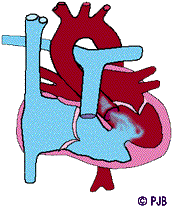Congenital
Heart Disease
 Somewhere between 30 and
60% of children with Down syndrome have congenital heart defects, with ventricular
septal defects and complete atrioventricular septal defects being the most
prevalent. Other newborns with Down syndrome are diagnosed with tetralogy
of Fallot or patent ductus arteriosus.
Somewhere between 30 and
60% of children with Down syndrome have congenital heart defects, with ventricular
septal defects and complete atrioventricular septal defects being the most
prevalent. Other newborns with Down syndrome are diagnosed with tetralogy
of Fallot or patent ductus arteriosus.
Because young children
with Down syndrome develop early increases in pulmonary vascular resistance,
there is less left to right intracardiac shunting in the newborn period than
there will be later in infancy. For this reason, neonates with significant
septal defects may show no signs of congestive heart failure or respiratory
involvement right after birth. These babies can seem healthy during their
first 8 months, and may even seem to be getting better. Unless the defect
is corrected surgically, however, the infants may be undergoing significant
pulmonary vascular changes that have lifelong consequences.
It’s extremely important,
therefore, that all babies with Down syndrome be evaluated by a pediatric cardiologist
and have an echocardiogram during their first three months of life. In some
cases, children with mild congenital defects are monitored regularly and the
defects resolve without surgery. Other children need intensive medical intervention
in the form of diuretics, digitalis, and other cardiac medications. And about
half the children with septal defects require open heart surgery to repair the
defect and prevent further cardiopulmonary problems. The good news is that these
children generally do well with the surgery and go on to live healthy lives.
For more
indepth info about ventricular septal defect and congenital heart disease, please
see the RnCeus.com interactive course: Ventricular
Septal Defect: Effects, Assessment & Treatment.
Instant
Feedback:
If
babies with Down syndrome do well during their first eight months of
life,
we can safely surmise that they have no congenital heart disease.
Nurses caring for infants
with Down syndrome should be aware of the early symptoms of heart disease in
babies:
- difficulty feeding (perspiring,
rapid or labored breathing, and fatigue)
- vomiting after meals
- poor weight gain
- failing to awaken for
feedings
- rapid, shallow breathing
and intercostal retractions
- cyanosis
Instant
Feedback:
Vomiting
and poor weight gain may be signs of early heart disease in babies with
Down syndrome.
When working with children
who have valvular disease, it’s important to determine the physician’s
recommendations for prophylactic treatment for subacute bacterial endocarditis
(SBE) and counsel the parents when indicated. SBE prophylaxis involves preventive
antibiotic therapy before dental cleanings and other invasive procedures.
Clearly, nurses can play
many roles in the lives of young children with Down syndrome and congenital
heart disease. Encouraging parents to follow health screening guidelines, teaching
them to administer medications and other treatments as needed, and providing
peri-operative care related to open heart surgery are expectations of nurses
in a variety of settings.
 Somewhere between 30 and
60% of children with Down syndrome have congenital heart defects, with ventricular
septal defects and complete atrioventricular septal defects being the most
prevalent. Other newborns with Down syndrome are diagnosed with tetralogy
of Fallot or patent ductus arteriosus.
Somewhere between 30 and
60% of children with Down syndrome have congenital heart defects, with ventricular
septal defects and complete atrioventricular septal defects being the most
prevalent. Other newborns with Down syndrome are diagnosed with tetralogy
of Fallot or patent ductus arteriosus.